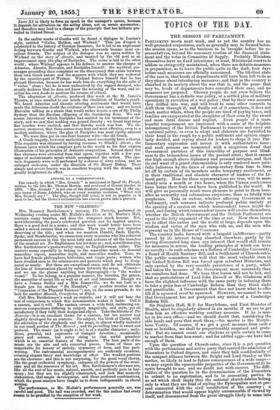In the earlier works of Goethe will be found a
dialogue in Lucian's style, entitled " Gothe, Heiden, und Wieland." This jeu d'esprit is celebrated in the history of German literature, for it led to an unpleasant feeling between Goethe and Wieland, who afterwards became most ex- cellent friends. The subject of the dialogue was an opera written by "Wieland on the story of .A/castis, and vaunted by the old poet as an improvement upon the play of Euripides. The scene is laid in the other world ; where Wieland appears in his defence to answer the charges of Admetus, Alcestis, Hercules, and Euripides himself; the mythical per- sonages grounding their complaint on the discrepancy that exists between their own Greek nature and the manners with which they are endowed by the courtier-poet of Weimar. Wieland flatters himself that he has pleased Hercules, because he has made him do everything for the sake of 4' virtue" alone ; but he is soon undeceived by the rugged demigod, who stoutly declares that he does not know the meaning of the word, and as- cribes his own deeds to motives the reverse of ethical.
The adaptation of Alcestis, produced this week at the St. James's Theatre, at once recalled to our minds the ebullition of Goethe's youth. We heard Admetus and Alcestis uttering sentiments that would have made the Athenians doubt the evidence of their own ears ; and we heard Hercules talking in a strain that would rather denote a son of Sir Philip Sydney than the Bceotian offspring of the thundering Zeus. We saw scenes introduced which Euripides had omitted in his treatment of the story, and we saw:that nothing was gained thereby ; we found that some fine touches were omitted, and that thereby much was lost. We ob- served, moreover, that those scenes were best and most effective, even to a modern audience, where the plan of Euripides was most rigidly adhered to. We were thus put in excellent humour with—the old Greek. A Greek tragedy, however modernized, must necessarily have a chorus. This requisite was obtained by having recourse to Gluck's 211ceste ; the famous opera which the composer gave to the world as his first express illustration of his principles of dramatic composition. Several short but -fine choruses were extracted from that opera, together with a few pas- sages of melodramatic music which accompanied the action. The ope- ratic fragments were well performed by a chorus of sixty voices, and an enlarged orchestra, under the direction of Sir Henry Bishop. Their simple and severe beauty was in excellent keeping with the drama, and greatly heightened its effect.


























 Previous page
Previous page